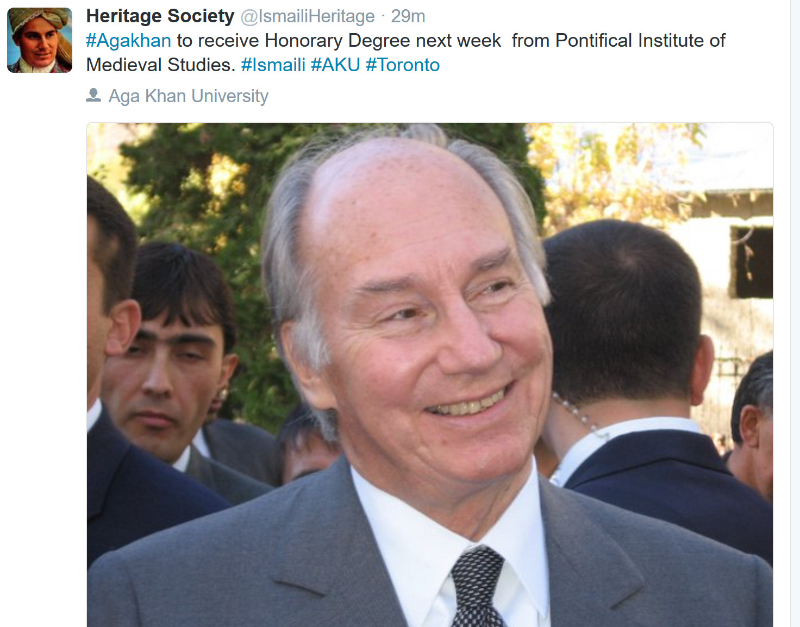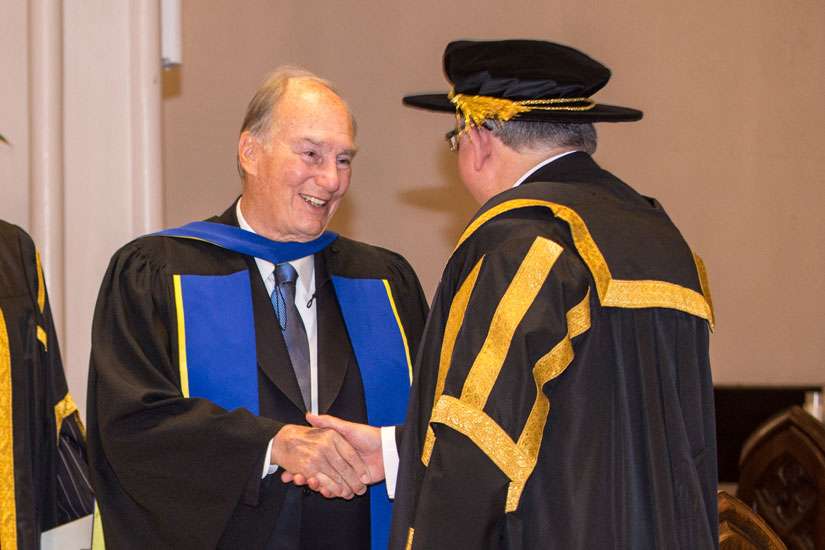The convocation of the Pontifical Institute of Mediaeval Studies took place at St Basil’s Collegiate Church in Toronto. Mr. David Mulroney, President of the University of St. Michael's College and former Ambassador to the Republic of China delivered the citation.
AKDN / Mo Govindji
Your Highness, Your Eminence and Chancellor, Praeses, distinguished guests, ladies and gentlemen:
I am honoured to present today His Highness the Aga Khan, the 49th hereditary Imam, or spiritual leader, of the Shia Ismaili Muslims. His Highness is also of course an honorary citizen of this country, a person whose many contributions and connections to Canadian life and society we extend with today’s ceremony.
Given the energy and vigour with which his Highness pursues his calling, and the extent to which he has used it to benefit not only Ismaili Muslims but a broad range of communities around the world--with a particular attention to the most vulnerable--it is all the more impressive to recall that His Highness has been serving in this remarkable capacity since 1957.
The Aga Khan Development Network partners with public and private institutions around the world to build (often, actually to re-build) the institutions necessary to sustain and nurture communities. This mirrors the activism of the Ismaili community, whose members are among the agents of change, the difference makers, in so many parts of the globe, Canada included.
Canadians take special pride in the links that connect us to the Aga Khan, to the Ismaili community and to the important values that they so effectively champion. It is a bond that stretches back to 1972, to an earlier Trudeau era, when Canada provided a home to thousands of Ismailis who had been expelled from the Uganda they had helped to build.
Many have been the rewards that have flowed back to us, most notably the remarkable and continuing contribution of the Ismaili community to our national life. His Highness has himself been most generous, as visitors to the Aga Khan museum here in Toronto can attest.
He has also paid us the compliment of associating us with a powerfully important word: pluralism. As he has written, pluralism is “one of our fundamental values and an inescapable condition for world peace and further human development.” He generously reinforced the connection between Canada and respect for this value by making our national capital home to a Global Centre for Pluralism.
This is a gift that keeps on giving, because the Centre also serves as a perpetual reminder to Canadians of what we can offer the world when we are truly at our best. His Highness, through the work of the Centre, reminds us of our duty, and inspires us to do even more.
Of course, pluralism for His Highness means something more than diversity for its own sake. Our celebration of the many ways in which human society orders and expresses itself is grounded in a sense of shared humanity. As, the Aga Khan Development Network reminds us, we find “in the very diversity of human kind, signs that point to the Creator and Sustainer of all creation.”
Pluralism inevitably involves that most Catholic of words, connectedness.
And His Highness is a great connector, a builder of bridges metaphorically and actually. He has, for example, reconnected Afghanistan with its traditional role as a cross roads of trade and people, art and ideas. This has been evidenced by the construction, thanks to His Highness, of multiple bridges linking Afghans with their northern neighbours.
But it has also been achieved through numerous projects designed to re-connect Afghans with their history and rich array of cultures. His Highness is a great proponent of something that the friends of this Institute also know so well: that openness to learning and culture inevitably restore a sense of common humanity, and with it, an awakened appreciation of the many signs that do indeed point to our Creator.
These natural impulses to learn, communicate and connect were anathema to the extremists who for too long held sway in Afghanistan. Such implacable enemies of progress, tolerance and pluralism sought to disconnect Afghanistan from its neighbours, to uncouple it from its history, and to deflect it from its future.
They did great damage, but His Highness has helped to rebuild and reanimate a broken society. Thanks to the efforts of the Aga Khan Development Network, life is returning to the Bamyan valley, where the tolerant Hazara people, primarily Shia Muslims themselves, embrace a history that includes the golden age of central Asian Buddhism. And in Kabul, a city shattered by 30 years of war, hope and pride have taken root in the restoration, again thanks to His Highness, of the mausoleum of the emperor Babur, and of the great gardens that surround it. Babur was the founder of the Mughal Empire, and a contemporary to those similarly ambitious and larger-than-life princes Henry VIII and Francis I. He laid siege to Kandahar in the same year in which Henry and Francis laid siege to one another at the Field of the Cloth of Gold.
Allow me a personal observation on His Highness as a builder of bridges and a connector of people. While serving in Beijing, I was interested to read one of His Highness’s speeches in which he remarked on the size and vitality of the Ismaili community in the far west of China. So, I travelled to the city of Tashkurgan to meet them for myself.
It was a deeply moving experience, and one that resonated with me as a Catholic. I met people of faith and hope and tremendous goodwill. They readily acknowledged the sorrow of being physically separated from their Ismaili brothers and sisters and from His Highness. But they displayed a profound and confident spiritual connection to their global community. They possess a faith that refuses to be hemmed in or isolated by man-made barriers, a conviction that owes much to their very real and justified sense of being in communion with their spiritual leader.
Let us celebrate today our own connection to His Highness, a champion of pluralism, a transcender of borders and barriers, and a great, wise and benevolent connector.
http://www.akdn.org/speech/pontifical-i ... s-aga-khan

